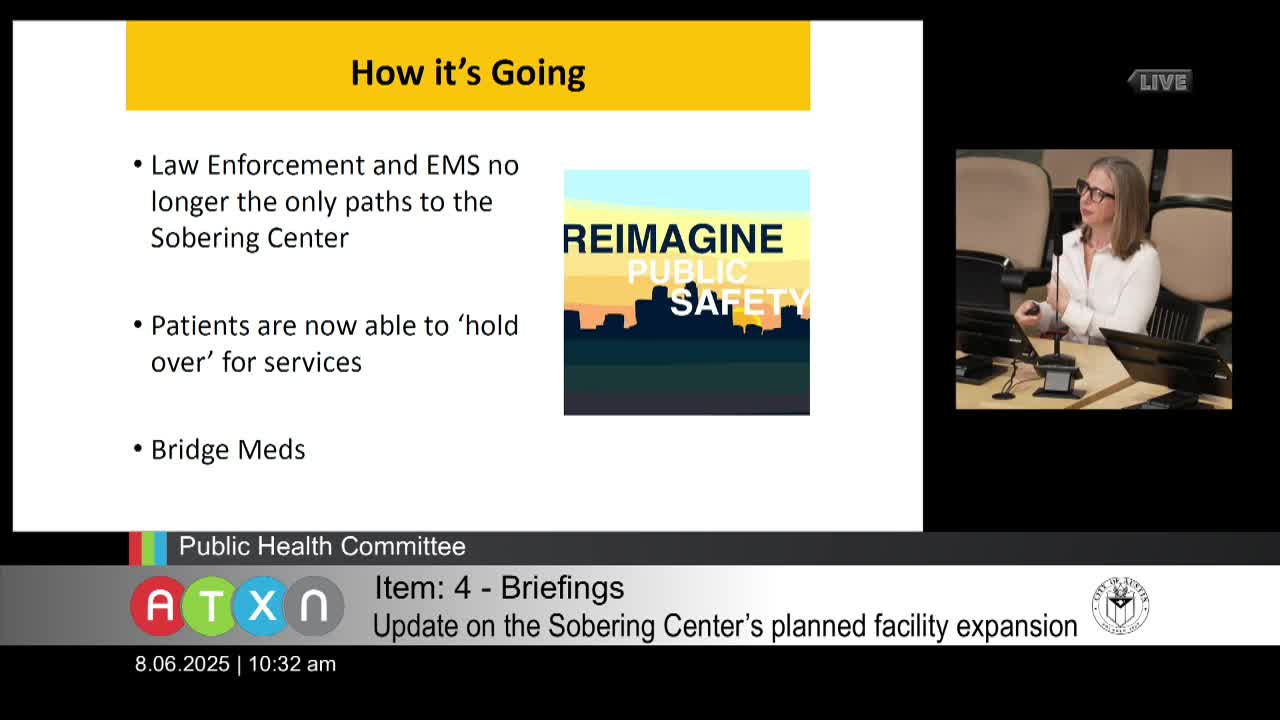Austin's Sobering Center Expands with County-Funded Second Floor for Sober Patients
August 06, 2025 | Austin, Travis County, Texas
This article was created by AI summarizing key points discussed. AI makes mistakes, so for full details and context, please refer to the video of the full meeting. Please report any errors so we can fix them. Report an error »

The Austin Public Health Committee meeting on August 6, 2025, highlighted significant developments in the city's efforts to enhance support for individuals struggling with substance use. A key focus was the planned expansion of the sobering center, which aims to improve services for those in need of immediate care.
The expansion involves moving sober individuals to the newly renovated Second Floor of the sobering center, which now features 14 beds funded by the county. This initiative is part of a broader strategy to provide on-site medical support, including a "street medicine" program that allows community health paramedics to administer medications to individuals experiencing withdrawal symptoms. This timely intervention is crucial for stabilizing patients and ensuring their safety until they can access further treatment.
The renovations, funded by leftover American Rescue Plan Act (ARPA) dollars, have equipped the Second Floor with necessary amenities, including security cameras and technology. However, the center is currently awaiting the hiring of additional staff to begin operations. The urgency of this expansion is underscored by the need to free up space on the First Floor for first responders dealing with intoxicated individuals.
In terms of funding, the committee discussed the fiscal year 2026 budget request, which initially sought $2.8 million to maintain operations and enhance services. However, the city manager's proposed budget included significant cuts, reducing the allocation to $2.4 million. Council Member Vela is advocating for the full operating budget to be included in the upcoming tax rate election budget.
Another point of discussion was the role of Central Health in the sobering center's operations. Historically, Central Health has not prioritized substance use services, which has raised questions about their involvement in future funding and support for the center.
As the city moves forward with these initiatives, the expansion of the sobering center represents a critical step in addressing the urgent needs of the community, particularly for those facing substance use challenges. The committee's discussions reflect a commitment to improving public health resources and ensuring that vulnerable populations receive the care they require.
The expansion involves moving sober individuals to the newly renovated Second Floor of the sobering center, which now features 14 beds funded by the county. This initiative is part of a broader strategy to provide on-site medical support, including a "street medicine" program that allows community health paramedics to administer medications to individuals experiencing withdrawal symptoms. This timely intervention is crucial for stabilizing patients and ensuring their safety until they can access further treatment.
The renovations, funded by leftover American Rescue Plan Act (ARPA) dollars, have equipped the Second Floor with necessary amenities, including security cameras and technology. However, the center is currently awaiting the hiring of additional staff to begin operations. The urgency of this expansion is underscored by the need to free up space on the First Floor for first responders dealing with intoxicated individuals.
In terms of funding, the committee discussed the fiscal year 2026 budget request, which initially sought $2.8 million to maintain operations and enhance services. However, the city manager's proposed budget included significant cuts, reducing the allocation to $2.4 million. Council Member Vela is advocating for the full operating budget to be included in the upcoming tax rate election budget.
Another point of discussion was the role of Central Health in the sobering center's operations. Historically, Central Health has not prioritized substance use services, which has raised questions about their involvement in future funding and support for the center.
As the city moves forward with these initiatives, the expansion of the sobering center represents a critical step in addressing the urgent needs of the community, particularly for those facing substance use challenges. The committee's discussions reflect a commitment to improving public health resources and ensuring that vulnerable populations receive the care they require.
View full meeting
This article is based on a recent meeting—watch the full video and explore the complete transcript for deeper insights into the discussion.
View full meeting
